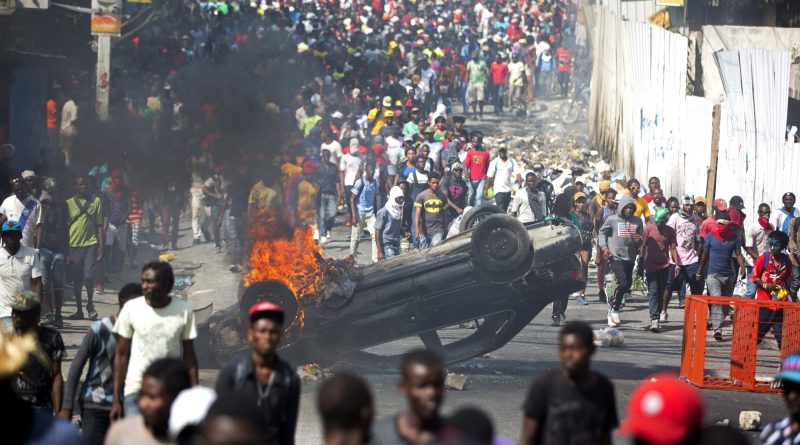Protests in Haiti
Key Actors
- Jovenel Moise – President of Haiti
- Jean-Henry Ceant – Former Prime Minister of Haiti, made to resign on March 21st, 2019
- Protesters in Haiti
Background
Since Fall of 2018, Haiti has been shaken by violent street protests, leading up to the dismissal of Prime Minister Jean-Henry Ceant from office on March 21st, 2019. These protests are taking place due to the economic misery of Haiti and the inability of President Jovenel Moise to rid of corruption, specifically with the case of the misplacement of US $2 billion in foreign aid money.
Instituted by Venezuelan president Hugo Chavez in 2005, the PetroCaribe program allowed for Caribbean nations to pay only a small fraction of the market price for billions of dollars worth of oil. The balance owed would be paid back over a period of 25 years with low interest. In the meantime, the Caribbean governments would be able to fund and make significant progress in economic development and infrastructure. However, when it came to the Caribbean nation of Haiti, US $2 billion of the much-needed money meant for social programs was embezzled. 14 members of the government were accused of involvement in the alleged fraud, but to date, no one has been accused or charged.
Social and Economic Status of Haiti
Haiti is economically unstable. The country is struggling with skyrocketing inflation while still trying to recover from the aftermaths of the earthquake in 2010 and of Hurricane Matthew in 2016. At present, more than six million people live on less than $3.15 per day. Haiti remains one of the world’s poorest countries.
Haiti is also dealing with social issues, with the basic needs of the people and long-term human rights problems going unaddressed by the government. As of May 2018, nearly 37,000 people were still living in displacement camps—half of which were lacking proper sanitation—from the 2010 earthquake, with no aid from authorities. Illiteracy is also a prominent issue in Haiti; half of all adolescents aged 15 and older are unable to read, and at least 350,000 youth remain out of primary and secondary school. Female discrimination is widespread as well, as there is no specific legislation against gender-based violence; and there is still extensive use of child labourers with approximately 225,000 to 300,000 children working without pay.
The Protests
On Friday, February 15th, 2019, Haitians at Port-Au-Prince vowed to keep protesting until President Jovenel Moise resigns, despite Moise stating in a televised address the previous day that he would not surrender the country to “armed gangs and drug dealers.” Moise said that the voices of the people were heard, that he knew the problems that tormented them, and that government has taken a lot of measures to eliminate them. He also stated that the then-Prime Minister Henry Ceant would share the details of the measures the day after. None were announced, causing a fresh uproar in Port-Au-Prince.
Protestors are mainly angry about inflation as well as the government’s failure to prosecute the misappropriation of the US $2 billion from the PetroCaribe program. Few believe that the government will take any action to relieve the economic crisis. Wilder Saintil, a 35-year old shop owner, says he has been forced to eat less, cannot work or send his two children to school, and will continue to take part in the protests until Moise resigns. Such is the scenario of many other Haitian families.
“The escalating violence is heading towards catastrophe,” says the head of the Haitian Chamber of Commerce and Industry Frantz Bernard Craan. “Thugs are attacking businesses, gas stations are burning, tires are burning, and people are setting roadblocks up in the streets. The police have no means of controlling violence, and no actions have been taken to pacify the angry population.”
Foreign Involvement
American and Canadian diplomats have reportedly been trying to alleviate the situation, holding meetings with Moise and his parliament and urging restraint in facing the protests. The U.S. Department of State issued a travel advisory warning people to not travel to Haiti due to crime and civil unrest.
Sources
Charles, Jacqueline. “Haiti Business Leaders Ask President to Break Gridlock after Another Day of Violence.” Miami Herald, 12 Feb. 2019, www.miamiherald.com/news/nation-world/world/americas/haiti/article226112930.html.
Gatehouse, Jonathon. “Haiti’s Government under Siege as Anger Grows over Allegations Officials Pilfered Foreign Aid.” CBC News, 19 Nov. 2018, www.cbc.ca/news/thenational/national-today-newsletter-haiti-wataynikaneyap-power-1.4898679.
Sanon, Evens. “Haiti to Unveil Economic Measures to Quell Violent Protests.” AP NEWS, Associated Press, 15 Feb. 2019, www.apnews.com/09b2f5661e394de78249c246db91205c.
Author Unknown. “World Report 2019: Rights Trends in Haiti.” Human Rights Watch, 17 Jan. 2019, www.hrw.org/world-report/2019/country-chapters/haiti.
https://storage.googleapis.com/afs-prod/media/media:68d4a8aeb6e84fa69bf47569ef244594/2000.jpeg

